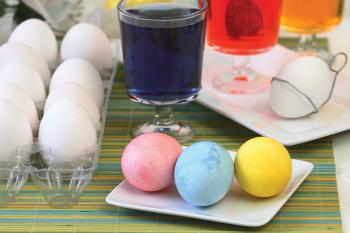
AgCenter: Use natural dyes for Easter eggs
BATON ROUGE, La. – Bags of lavender tea, cranberries and red onion skins simmered together to make a natural red dye. Students in Judy Myhand’s Food FUNdamentals class in the LSU College of Agriculture were preparing to dye eggs using items found around the kitchen to make the dyes.
“I’m digging through the freezer and using things we won’t need,” said Mallory Katz, a junior in agriculture education and Myhand’s student worker.
The spice turmeric turned the eggs a light golden yellow. When dipped in the blueberry mixture, the eggs took on a purple tone, producing purple and gold creations.
Natural dyes did not give the eggs the bright, vibrant colors store-bought dyes would, but Myhand said this is a natural and economical way to dye Easter eggs.
The goal of the Food FUNdamentals class is to teach students basic cooking techniques so they can prepare healthful and delicious meals for themselves. With Easter around the corner, the students were working with eggs.
They prepared a visually appealing spread that included deviled eggs, egg puffies, huevos rancheros, eggs and avocado on toast, and eggs baked in bell peppers. In every class, students get to enjoy their work.
“They learned that eggs are a protein so if you overcook them, they become rubbery,” Myhand said.
A main component of this day’s class is food safety. Myhand said safe egg handling is important this time of the year when families are dying eggs for Easter.
“Eggs are contaminated with salmonella, both inside and outside, which a lot of people don’t realize,” Myhand said.
She said hand washing is imperative when handling eggs and avoiding cross-contamination of raw eggs with fresh foods.
The LSU AgCenter offers these tips for safely hard-cooking eggs:
—To hard-cook eggs properly, never boil them. Place them in single layer in a saucepan, and add enough tap water to cover them by at least 1 inch. Add a tablespoon of vinegar to allow better dye coverage after cooking.
—Cover the pan and quickly bring the water just to a boil. Then turn off the heat or remove the pan from the burner, and let the eggs stand in the hot water in a covered pan for 15 minutes. After 15 minutes, run cold water over the eggs, or place them in ice water until they are cooled completely.
—Refrigerate them if you won’t be coloring them right away, but do not return them to the carton.
Myhand advised against hiding dyed eggs outdoors where they may come in contact with dirt, pets or animal feces.
“The shells on hard-cooked eggs are more permeable, making the eggs more susceptible to bacteria,” she said.
Cooked eggs also have a shorter shelf life than raw eggs. Hard-cooked eggs in the shells can be kept for three to four days in the refrigerator. They can be left out of the refrigerator for about two hours.
- Log in to post comments
